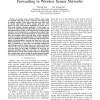Free Online Productivity Tools
i2Speak
i2Symbol
i2OCR
iTex2Img
iWeb2Print
iWeb2Shot
i2Type
iPdf2Split
iPdf2Merge
i2Bopomofo
i2Arabic
i2Style
i2Image
i2PDF
iLatex2Rtf
Sci2ools
128
click to vote
GLOBECOM
2010
IEEE
2010
IEEE
A Distributed Wake-Up Scheduling for Opportunistic Forwarding in Wireless Sensor Networks
In wireless sensor networks (WSNs), sensor nodes are typically subjected to energy constraints and often prone to topology changes. While duty cycling has been widely used for energy conservation in WSNs, random walks have been popular for many delay-tolerant applications in WSNs due to their many inherent desirable properties. In this paper, we consider an opportunistic forwarding under an asynchronous and heterogeneous duty cycling. We first show that its resulting packet trajectory can be interpreted as a continuous-time random walk, and then provide an analytical formula for its end-to-end delay. Since the extremely large end-to-end delay is still undesirable even for most delay-tolerant applications, we develop a distributed wake-up scheduling algorithm in which each node autonomously adjusts its (heterogeneous) wake-up rate based only on its own degree information so as to improve the worst-case end-to-end delay. In particular, we prove that our algorithm outperforms pure homogen...
Related Content
| Added | 11 Feb 2011 |
| Updated | 11 Feb 2011 |
| Type | Journal |
| Year | 2010 |
| Where | GLOBECOM |
| Authors | Chul-Ho Lee, Do Young Eun |
Comments (0)

